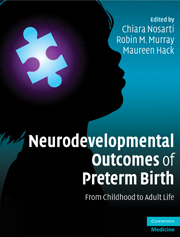Book contents
- Frontmatter
- Contents
- List of contributors
- Preface
- Section 1 Introduction
- Section 2 Neuroimaging
- Section 3 Behavioral outcome
- Section 4 Neuropsychological outcome
- 11 Cognitive and functional outcomes of children born preterm
- 12 Methodological considerations in neurodevelopmental outcome studies of infants born prematurely
- 13 Language function after preterm birth
- 14 A cognitive neuroscience perspective on the development of memory in children born preterm
- 15 Executive function development in preterm children
- Section 5 Applied research
- Section 6 Conclusions
- Index
14 - A cognitive neuroscience perspective on the development of memory in children born preterm
from Section 4 - Neuropsychological outcome
Published online by Cambridge University Press: 06 July 2010
- Frontmatter
- Contents
- List of contributors
- Preface
- Section 1 Introduction
- Section 2 Neuroimaging
- Section 3 Behavioral outcome
- Section 4 Neuropsychological outcome
- 11 Cognitive and functional outcomes of children born preterm
- 12 Methodological considerations in neurodevelopmental outcome studies of infants born prematurely
- 13 Language function after preterm birth
- 14 A cognitive neuroscience perspective on the development of memory in children born preterm
- 15 Executive function development in preterm children
- Section 5 Applied research
- Section 6 Conclusions
- Index
Summary
Introduction
Memory is an important component of cognitive function, allowing individuals to build a stable knowledge base and to remember the details of everyday life. Abnormalities in the brain regions involved in memory, including the prefrontal cortex, caudate nucleus, and hippocampus, as well as the connections between them, have been documented in children who were born preterm and may result in compromised memory. The aim of this chapter is to briefly review what studies in cognitive neuroscience have revealed about the normal development and neural bases of different types of memory and to consider whether and how these skills are affected by premature birth.
Types of memory
Memory is not a unitary skill, but instead consists of a number of different components relying on different neural systems. One fundamental distinction is between implicit and explicit memory. Implicit memory is typically described as non-conscious, automatic, or not amenable to verbal recall, and examples include procedural skills such as knowledge of how to ride a bicycle. Explicit memory is typically described as knowledge that can be consciously brought to mind, and examples include knowledge of the definitions of words or memory for the “what, where, and when” of specific events such as a summer holiday. Explicit memory itself can be further divided into short-term or working memory, and long-term memory. Working memory refers to the type of memory used to hold information in mind for short periods until it is used to solve a problem or carry out a task, such as remembering a phone number until it is dialed.
- Type
- Chapter
- Information
- Neurodevelopmental Outcomes of Preterm BirthFrom Childhood to Adult Life, pp. 185 - 194Publisher: Cambridge University PressPrint publication year: 2010
- 1
- Cited by



